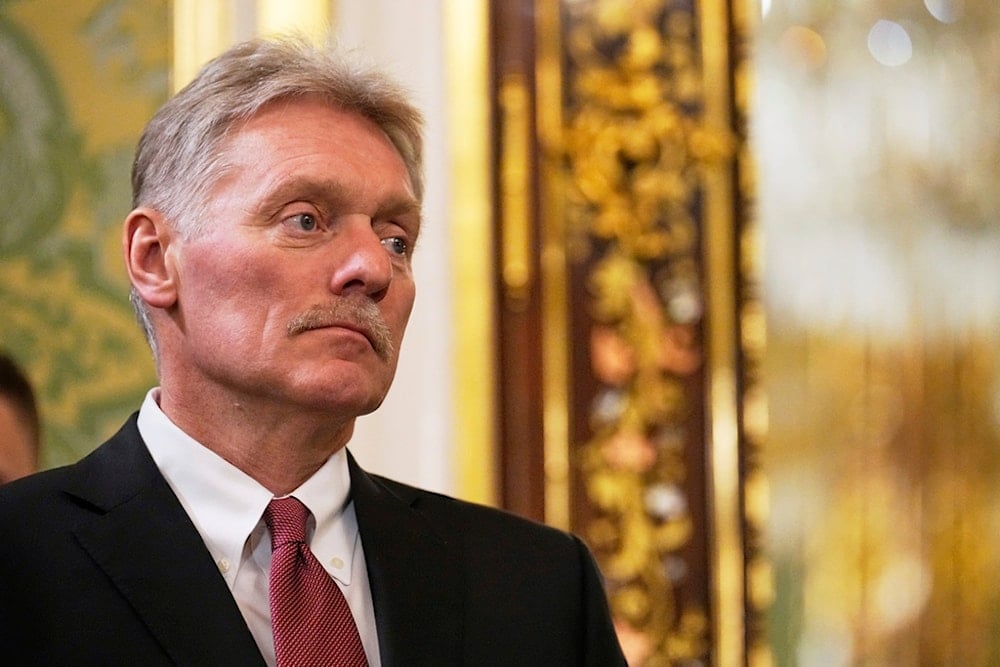Russia dismisses sanctions pressure over Ukraine ceasefire proposal
The Kremlin says sanctions won’t sway Russia’s stance on a 30-day Ukraine ceasefire, stressing its openness to dialogue but firm position on the conflict.
-

Kremlin spokesman Dmitry Peskov attends a meeting of Russian President Vladimir Putin and Venezuelan President Nicolas Maduro at the Kremlin in Moscow, Russia, Wednesday, May 7, 2025 (AP)
The Kremlin has pushed back against Western threats of new sanctions, with spokesman Dmitry Peskov stating on Saturday that pressure on Russia to accept a 30-day ceasefire in Ukraine is ineffective and will not force Moscow into submission.
Speaking to CNN, Peskov rejected the notion that Russia had been cornered by European leaders threatening economic retaliation should it refuse Kiev’s proposal for a month-long truce. “No, I don’t think so,” he said in response to whether sanctions were changing Moscow’s calculations.
Peskov reiterated that Russian President Vladimir Putin had already announced a unilateral three-day ceasefire to coincide with the 80th anniversary of the Soviet victory in the Great Patriotic War. He pointed out that Kiev failed to respond to the gesture.
“Have you heard any reaction from Kiev? No. We have not heard it either. Have you heard any criticism of Kiev for not being able to respond or not willing to respond? No,” Peskov stated. “So, if Kiev is willing to have a ceasefire, why not have a ceasefire for at least three days?”
Russia position on ceasefire independent
According to Peskov, Russia has its own independent position on any ceasefire proposal and will evaluate the 30-day truce based on its strategic interests. He emphasized that Russia is accustomed to tensions with Europe and remains resilient in the face of political and economic pressure.
“We are open for dialogue, we are open for attempts to have a settlement in Ukraine. We do appreciate efforts on mediation,” he said, signaling that Moscow was willing to consider diplomatic avenues but would not be swayed by ultimatums.
The remarks come amid renewed international calls, led by France, Germany, and the UK, for a temporary halt in hostilities, which they argue could pave the way for more substantial peace negotiations. However, with both sides digging in, a breakthrough appears unlikely in the immediate term.
Ukraine backs 30-day ceasefire
Ukrainian Foreign Minister Andrii Sybiha announced Saturday that Ukraine, along with a coalition of allied nations, is prepared to implement a 30-day, full and unconditional ceasefire starting Monday, pending Russia's agreement and the presence of credible international monitoring mechanisms.
"Ukraine and all allies are ready for a full, unconditional ceasefire on land, air, and at sea for at least 30 days, starting already on Monday. If Russia agrees and effective monitoring is ensured, a durable ceasefire and confidence-building measures can pave the way to peace negotiations," Sybiha posted on X.
The announcement followed a high-level summit in Kiev attended by key European leaders: French President Emmanuel Macron, German Chancellor Friedrich Merz, UK Prime Minister Keir Starmer, and Polish Prime Minister Donald Tusk.
Allies support proposal
NATO Secretary General Mark Rutte, along with over 20 global leaders, also voiced support for the truce. "This starts with a 30-day unconditional ceasefire and must be underpinned by continued, concrete support," Rutte said.
Peskov stated that any ceasefire would need to include a complete halt to US and European weapons deliveries to Ukraine. "Otherwise it will be an advantage for Ukraine. Ukraine will continue their total mobilisation, bringing new troops to (the) frontline," he told ABC News.
Peskov added that President Vladimir Putin supports a ceasefire "in principle" but emphasized that current Russian battlefield advances and the ongoing influx of Western arms undermine the viability of a pause in hostilities.

 4 Min Read
4 Min Read









